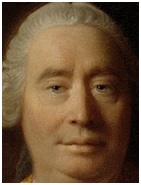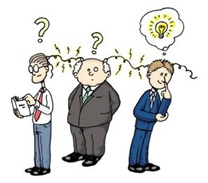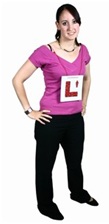|
 |
|
 |
David Hume - Philosophy, Ethics and Learning
David Hume (1711-76)
Scottish philosopher (pictured right) , historian, economist and close friend of Adam Smith. He never became a professor because of his atheism, despite his popularity, good nature and genius.
His most famous book is... A Treatise of Human Nature (published in two volumes in 1739 and 1740).
What did he say about ethics and learning?
1. Nothing is certain We expect something to happen because it occurs again and again (like the sun rising). But we can’t be certain that it will happen again. Nothing is certain (except in mathematics) which is why Hume is called a sceptic. For example, in Hume’s time, everyone thought that all swans were white until black swans were found in Australia in 1790! Therefore:
This is a problem for science which often says that one thing will always lead to another. 2. Question everything and find truth
So Hume strongly opposed superstition. “A wise man proportions his belief to the evidence”, he said. 3. Avoid arrogance
“When men are the most sure and arrogant, they are commonly the most mistaken”, he said.
4. Perception is important Your knowledge of something depends on how you and your imagination see it and feel it. For example, you may think something or someone is beautiful but other people may not. “Beauty in things exists in the mind which contemplates them”, he said.
5. We are creatures of habit We do things the way things have always been done. Custom, he said, is “the guide of life”. 6. Learn from failure and experience Knowledge comes from:
a) clarity Despite its significance the first edition of his Treatise of Human Nature was a commercial flop. So he re-wrote it to make it easier to read.
b) experience (so make your life as worthwhile, varied and creative as possible). 7. Be happy and do good Helping other people is particularly important, but you should also:
Our moral convictions are not determined by reason (which discovers truth or falsehood) but by our passions or feelings like love, humility, hope, fear and hatred. This is what he meant when he said: “Reason is and ought only to be the slave of the passions”. What is right or good depends on the goodness of people’s motives and has nothing to do with religion (he was an atheist).
8. Hume’s Fork This is the name given to the two questions he asked to test the truth of any idea:
If the answer to both is no, the idea is rubbish. This is why Hume didn’t believe in God. 9. People matter most People are more important than anything else and must be passionate and self-motivated to make the most of their ability.
Key quote on positive thinking A propensity to hope and joy is real riches; one to fear and sorrow real poverty.
Key quote on decision making A wise man proportions his belief to the evidence.
Key quotes on learning and wisdom When men are the most sure and arrogant, they are commonly the most mistaken.
Key quote on ethics Good and ill are entirely relative to human sentiment and affection. Reason is and ought only to be the slave of the passions. Beauty in things exists in the mind which contemplates them.
Key quote on creativity Truth springs from argument amongst friends.
Key quote on money Money...is none of the wheels of trade: it is the oil which renders the motion of the wheels more smooth and easy.
Key quote on God and religion In all ages of the world, priests have been the enemies of liberty. |
|
|
||
|
|
|
||
|
||
| Copyright © wisdomtowin.com All Rights Reserved | ||
|








